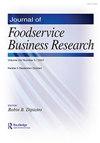有机食品体验与顾客幸福感的关系:美国与印度的跨文化研究
Q2 Agricultural and Biological Sciences
引用次数: 1
摘要
虽然以前的文献已经研究了顾客的有机产品消费行为,但顾客的有机食品体验与他们的健康之间的具体关系尚未得到研究,特别是自COVID-19发病以来。在自我决定和一致性理论的基础上,建立了有机品牌特征(即温暖和能力)、感知一致性、享乐和幸福的因果模型。采用偏最小二乘结构方程模型(PLS-SEM)对五个研究假设进行检验。主要数据基于在美国和印度进行的在线消费者调查。PLS-SEM的结果表明,在美国和印度的样本中,顾客对某些有机品牌的感知温暖和能力通过增加他们对有机品牌的相似性(认同感)对顾客的幸福感产生了积极的影响。本研究的结果表明,感知一致性与顾客的幸福感密切相关。此外,我们还发现了印度和美国有机食品品牌特征对消费者幸福感的不同影响。[源自作者]本文章由计算机程序翻译,如有差异,请以英文原文为准。
Relationships between organic food experience and customers’ well-being: a cross-cultural study between America and India
Although previous literature has examined customers’ organic product consumption behaviors, specific relationships between customers’ experiences with organic food and their well-being have not been examined, especially since the onset of COVID-19. Based on the theories of self-determination and congruence, a causal model of organic brand characteristics (i.e. warmth and competence), perceived congruence, and hedonic and eudaimonic well-being is developed. Partial least squares structural equation modeling (PLS-SEM) is used to test five research hypotheses. Primary data are based on an online consumer survey conducted in America and India. The results of PLS-SEM show that in both the American and Indian samples, customers’ perceived warmth and competence from certain organic brands have a positive impact on customers’ well-being by increasing their sense of similarity (identity) with organic brands. The findings of this study suggest that perceived congruence is closely related to well-being in customers. Further, different impacts of organic food brand characteristics on customers’ well-being in India and America are identified. [ FROM AUTHOR]
求助全文
通过发布文献求助,成功后即可免费获取论文全文。
去求助
来源期刊

Journal of Foodservice Business Research
Agricultural and Biological Sciences-Food Science
CiteScore
4.40
自引率
0.00%
发文量
52
期刊介绍:
The Journal of Forecasting is an international journal that publishes refereed papers on forecasting. It is multidisciplinary, welcoming papers dealing with any aspect of forecasting: theoretical, practical, computational and methodological. A broad interpretation of the topic is taken with approaches from various subject areas, such as statistics, economics, psychology, systems engineering and social sciences, all encouraged. Furthermore, the Journal welcomes a wide diversity of applications in such fields as business, government, technology and the environment.
 求助内容:
求助内容: 应助结果提醒方式:
应助结果提醒方式:


